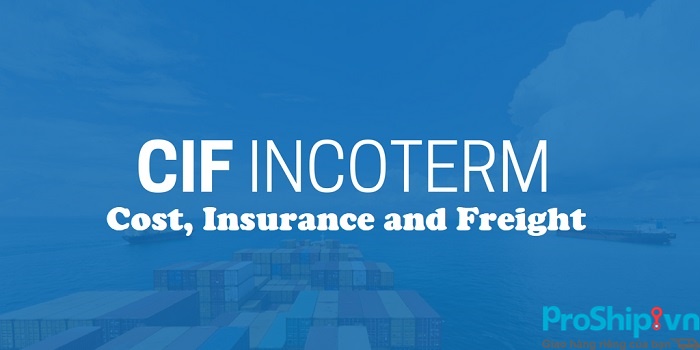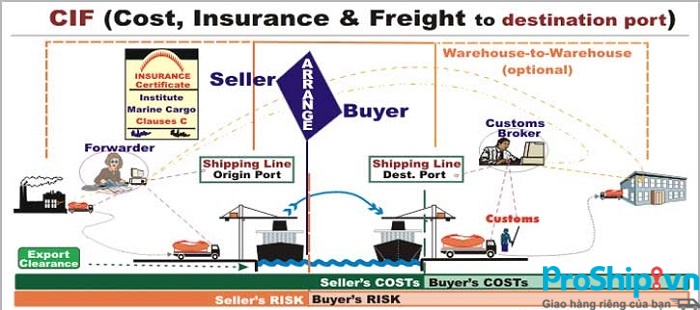– Bên bán, bên mua trong chuyển giao hàng hóa cần biết khái niệm CIF là gì?
– Các cá nhân liên quan trong giao nhận hàng cần nắm rõ những quy định trong điều kiện CIF?
– Người bán, người mua chưa biết cách áp dụng CIF sao cho hiệu quả, nên mua CIF khi nào?
Những quy định liên quan đến điều kiện CIF, về vai trò nghĩa vụ của người bán cũng như người mua trong Incoterm sẽ được Proship.vn chia sẻ một cách chi tiết nhất nhằm đáp ứng tối đa mọi vấn đề bạn đặt ra. Đặc biệt hơn cả là những lưu ý khi sử dụng CIF, những trường hợp cần thiết nên mua CIF Incoterm 2010 cũng được chỉ ra. Bạn đọc quan tâm có thể tham khảo để nắm vững kiến thức cơ bản & tìm kiếm cho mình một Đơn vị vận chuyển hàng hóa đường biển phù hợp và đáng tin cậy.
📦 Hotline Liên Hệ Vận Chuyển
🧭 Miền Trung
XEM THÊM: Vận chuyển Container giá rẻ – Hỗ trợ khai báo hải quan trọn gói
Điều kiện CIF là gì?
CIF là gì? CIF được hiểu là điều kiện giao hàng, tức là giao hàng tại cảng dỡ hàng: “Cost, Insurance, Freight (tiền hàng, bảo hiểm, cước phí)”. Thông thường, điều kiện này thường được viết liền với một tên cảng biển nào đó bất kỳ (ví dụ: CIF Haiphong). Về cơ bản, CIF có sự phân chia trách nhiệm và rủi ro giữa người mua với người bán trong Thương mại quốc tế.
Với điều kiện CIF này, người bán hàng phải chịu chi phí thuê tàu, bảo hiểm đến cảng dỡ hàng. Trong ví dụ trên với CIF Hải Phòng, bạn hiểu rằng người bán sẽ mua bảo hiểm và chuyển hàng đến cảng Hải Phòng, người mua nhận hàng và làm tiếp thủ tục từ địa điểm giao hàng này.

Với điều kiện CIF, bạn cần lưu ý rằng, rủi ro chuyển giao từ cảng xếp hàng mà không phải ở cảng dỡ. Người bán chỉ mua bảo hiểm đường biển thay cho người mua, sau đó họ gửi đơn bảo hiểm cho người mua cùng toàn bộ chứng từ cần thiết. Người mua mới là người được bảo hiểm. Do đó, nếu tổn thất xảy ra trong quá trình vận chuyển thì người mua chứ không phải người bán sẽ đứng ra đòi bảo hiểm đền bù thiệt hại. Hay nói cách khác, với điều kiện cơ sở giao hàng là CIF, người bán trả phí vận chuyển nhưng không chịu rủi ro cho hàng hóa trên chặng vận chuyển đường biển.
Tìm hiểu những quy định mới nhất trong điều kiện CIF
Sau khi đã tìm hiểu về khái niệm CIF là gì thì những quy định liên quan đến nghĩa vụ của người bán và người mua trong điều kiện CIF cũng là nội dung cần nắm rõ, cụ thể như sau:
| TRÁCH NHIỆM CỦA NGƯỜI BÁN | TRÁCH NHIỆM CỦA NGƯỜI MUA |
| Cung cấp hàng hóa: Người bán giao hàng, cung cấp hóa đơn thương mại, hoặc chứng từ điện tử tương đương, cung cấp bằng chứng của việc giao hàng (vận đơn đường biển). | Thanh toán: Người mua thanh toán tiền mua hàng cho người bán theo như quy định trong hợp đồng mua bán |
| Giấy phép và thủ tục: Người bán cung cấp giấy phép xuất khẩu, hoặc giấy ủy quyền từ địa phương cho lô hàng xuất khẩu. | Giấy phép và thủ tục: Người mua thực hiện thông quan và xin giấy phép nhập khẩu cho hàng hóa |
| Hợp đồng vận chuyển và bảo hiểm: Người bán ký hợp đồng bảo hiểm cho hàng hóa ở điều khoản bảo hiểm thông thường và chịu chi phí vận chuyển hàng hóa đến cảng chỉ định trên con tàu chuyên đi biển (hoặc có thể tàu dùng trong đường thủy nội địa). | Hợp đồng vận chuyển và bảo hiểm: Người mua không có nghĩa vụ ký kết các hợp đồng vận chuyển chính (main carriage) và bảo hiểm cho lô hàng. Với CIF, nghĩa vụ này thuộc về người bán hàng |
| Giao hàng: Người bán có trách nhiệm giao hàng lên trên con tàu tại cảng chỉ định. | Nhận hàng: Khi người bán giao hàng đến thì người mua có trách nhiệm nhận hàng được giao đến tại cảng dỡ hàng chỉ định. |
| Chuyển giao rủi ro: Rủi ro của bên bán chuyển sang bên mua khi hàng được giao qua lan can tàu. | Chuyển giao rủi ro: Người mua hoàn toàn chịu mọi rủi ro về thiệt hại và mất mát sau thời điểm hàng hóa được giao xong xuống boong tàu (on board) |
| Cước phí: Người bán chịu mọi chi phí để đưa hàng hóa lên tàu, chi phí bốc hàng và cả chi phí vận chuyển hàng cho đến cảng dỡ, chi phí mua bảo hiểm, khai hải quan, nộp thuế xuất khẩu và các lệ phí khác tại nước xuất khẩu. | Cước phí: Người mua chịu mọi chi phí liên quan đến hàng hóa phát sinh sau thời điểm hàng hóa được giao lên tàu. Chi phí người mua phải chi trả còn liên quan đến việc dỡ hàng tại cảng đến, (trừ phi có quy định trong hợp đồng chi phí này do người bán chịu) ,phí nộp thuế nhập khẩu và làm thủ tục thông quan hàng hóa. |
| Thông báo cho người mua: Khi hàng hóa bắt đầu được giao đi, người bán thông báo cho người mua về tình trạng hàng hóa sau thời điểm đó. | Thông báo cho người bán: Người mua phải thông báo cho người bán thông tin liên quan đến thời hạn vận chuyển của lô hàng, tên cảng dỡ hàng được chỉ định. |
| Bằng chứng giao hàng, các chứng từ vận chuyển hoặc chứng từ điện tử tương đương: Khi bộ chứng từ gốc được in ra sau khi hàng được giao lên tàu, người bán bằng chi phí của mình có nghĩa vụ chuyển đầy đủ bộ chứng từ này cho người mua. | Bằng chứng giao hàng, chứng từ vận chuyển hoặc các chứng từ điện từ tương đương: Người mua chấp nhận các chứng từ vận chuyển của người bán dưới các hình thức phù hợp. |
| Kiểm tra: Người bán chịu chi phí cho việc kiểm tra, quản lý chất lượng, đo lường, cân, kiểm đếm, đóng gói và ký hiệu hàng hóa. Nếu cần phải đóng gói đặt biệt, người mua thông báo cho người bán chi phí tăng thêm và bên mua chịu phần chí phí phát sinh này. | Kiểm nghiệm: Trừ khi có các hàng rào kiểm dịch bắt buộc tại nước xuất khẩu, các chi phí cho kiểm tra, xét nghiệm phải do người mua chi trả trước. |
| Nghĩa vụ khác: Người bán hỗ trợ trong việc lấy các chứng từ bổ sung được yêu cầu liên quan đến hàng hóa. | Nghĩa vụ khác: Hỗ trợ người bán cung cấp các chứng từ bổ sung khi được yêu cầu. |

📦 Hotline Liên Hệ Vận Chuyển
🧭 Miền Trung
Nên mua CIF trong trường hợp nào & lưu ý gì khi sử dụng?
Khi nào nên mua CIF?
CIF được đánh giá là một điều khoản có lợi dành cho các Doanh nghiệp vừa & nhỏ hoặc những Doanh nghiệp mới tham gia mua bán quốc tế và lượng hàng hóa chưa nhiều. Trong điều khoản này, trách nhiệm người mua với hàng hóa cao hơn người bán nhưng về mặt chi phí, họ sẽ phải chịu ít hơn do người bán đã chịu các chi phí cước biển…đưa hàng đến nước của người mua.
Cần hiểu rằng, CIF có thể khiến người mua tốn nhiều tiền hơn vì người bán trực tiếp làm việc với bên vận chuyển, có được giá họ mong muốn như cách kiếm thêm lợi nhuận. Bên cạnh đó, khi lượng hàng nhiều hơn, người mua có thể sẽ gặp phải khó khăn khi kiểm soát hàng hóa. Vì kể từ khi hàng được xếp lên tàu, người bán đã không còn trách nhiệm đối với hàng hóa nên nếu có vấn đề gì phát sinh trong quá trình vận chuyển, người bán có thể sẽ không thể xử lý kịp thời, thông tin sẽ đến chậm với người mua do phải qua các bên trung gian.
Những lưu ý khi sử dụng CIF?
Điều kiện CIF chỉ áp dụng cho những kiện hàng được giao bằng đường biển và đường thủy nội địa. Theo quy định của điều kiện CIF, cho dù hãng tàu có yêu cầu người bán giao hàng/giao Container ở ICD hay cảng biển lớn thì khi nào hàng đã nằm trên tàu rồi thì người bán mới hết trách nhiệm chịu rủi ro.
Trường hợp hãng tàu yêu cầu người bán hạ Container hàng ở ICD thì đoạn đường từ ICD ra cảng thường là do hãng tàu tự sắp xếp vận chuyển bởi chính hãng tàu còn người bán sẽ không thể kiểm soát được rủi ro đối với hàng của mình suốt quãng đường này. Nếu chẳng may có xảy ra rủi ro, người bán phải gánh mà không phải người mua. Mâu thuẫn ở đây có thể hiểu là hãng tàu (do người mua thuê) gây ra lỗi lầm vận chuyển từ ICD ra cảng biển lớn, khiến hàng hóa bị hư hao nhưng người bán phải chịu thiệt hại.

Do đó, người bán cần nhớ rằng, nếu giao hàng bằng Container, hãng tàu yêu cầu người bán chở hàng đến giao ở ICD kiểu như trên thì người bán nên chuyển sang sử dụng điều kiện CIP thay vì dùng CIF để người bán có thể kết thúc trách nhiệm ngay khi đã giao hàng cho hãng tàu tại ICD.
Người bán trả tiền cước thuê tàu đến cảng đích nhưng người bán chỉ gánh rủi ro liên quan đến hàng cho tới khi hàng lên tàu xong. Mọi rủi ro đối với hàng hóa trên đường biển và cả đoạn đường về sau ở nội địa nước người mua là do người mua chịu.
Nếu bạn đang quan tâm đến khái niệm về điều kiện CIF là gì & những quy định liên quan trong CIF có thể tham khảo bài chia sẻ trên để có căn cứ phân định rõ trách nhiệm cụ thể cho cả đôi bên (bên bán & bên mua). Đồng thời, nếu cá nhân các đối tượng liên quan trong Incoterm muốn tìm thuê một Dịch vụ vận chuyển, giao nhận hàng tận nơi theo yêu cầu của người bán hoặc người mua, vui lòng liên hệ qua hotline 0909 344 247 để được tư vấn, hỗ trợ miễn phí & báo giá nhanh cho bạn.
